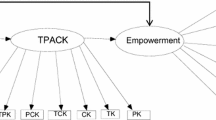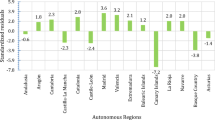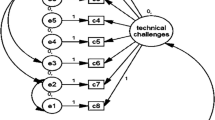Abstract
This qualitative study aimed to reveal patterns of empowerment among ICT (Information and Communication Technology) coordinators during ICT reform implementation in schools, and to examine if and how a sense of empowerment is expressed in their roles as teachers and as agents of change. Semi-structured in-depth interviews were conducted with 24 ICT coordinators from elementary schools, who were asked to describe the ICT role and its affects upon them. Findings indicate that participants felt empowerment in three areas: (1) personal; (2) subject area; and (3) leadership. All participants felt personally empowered by their new role. This was expressed in a sense of self-efficacy, a sense of responsibility, intrinsic motivation to act, and the ability to lead change and overcome resistance. Some also felt subject area empowerment, which expressed as a desire to learn more about ICT, pedagogical-technical knowledge, and improving the quality of their own ICT teaching. Others experienced leadership empowerment, which manifested as being able to instruct staff members, expand their own areas of authority and achieve hierarchical job advancement. Those 10 participants who experienced (1) and (2) saw their future career advancement as becoming better ICT teachers, whereas those 14 participants who experienced (1) and (3) perceived their ICT coordinator role as a lever to achieve leadership positions, not necessarily within education. All the ICT coordinators reported that the ICT coordinator position positively affected the way they undertook their other teaching roles. The study indicates that synergy results from holding a dual role as teacher and ICT coordinator.
Similar content being viewed by others
References
Akkuzu, N., & Akcay, H. (2012). Examination of the self-efficacy beliefs of prospective chemistry teachers in terms of different Yariahles. Educational Sciences: Theory & Practice, 12(3), 2208–2216.
Albion, P. R., Tondeur, J., Forkosh-Baruch, A., & Peeraer, J. (2015). Teachers’ professional development for ICT integration: Towards a reciprocal relationship between research and practice. Education and Information Technologies, 20(4), 655–673.
Aslan, A., & Zhu, C. (2016). Influencing factors and integration of ICT into teaching practices of pre-service and starting teachers. International Journal of Research in Education and Science, 2(2), 359–370.
Avidov-Ungar, O. (2010). “Islands of Innovation” or “Comprehensive Innovation”—Assimilating educational technology in teaching, learning, and management: A case study of school networks in Israel. Interdisciplinary Journal of E-Learning and Learning Objects, 6, 259–280.
Avidov-Ungar, O. (2015). A model of professional development: Teachers’ perceptions of their professional development. Teacher and Teaching: Theory and Practice, 22(6), 3–27.
Avidov-Ungar, O., Friedman, I., & Olshtain, E. (2014). Empowerment amongst teachers holding leadership positions. Teachers and Teaching, 20(6), 704–720.
Avidov-Ungar, O., & Nagar, N. M. (2015). ICT instructors’ sense of empowerment and viewpoint on the implementation of a national ICT program. Journal of Computers in Education, 2(2), 163–182.
Avidov-Ungar, O., & Shamir-Inbal, T. (2013). Empowerment patterns of leaders in ICT and school strengths following the implementation of national ICT reform. Journal of Information Technology Education: Research, 12, 141–158.
Bogler, R. (2005). The power of empowerment: Mediating the relationship between teachers’ participation in decision making and their professional commitment. Journal of School Leadership, 15, 76–98.
Bogler, R., & Somech, A. (2004). Influence of teacher empowerment on teachers’ organizational commitment, professional commitment and organizational citizenship behavior in schools. Teaching & Teacher Education: An International Journal of Research and Studies, 20, 277–289.
Chen, W. (2013). School leadership in ICT implementation: Perspectives from Singapore. The Asia-Pacific Education Researcher, 22(3), 301–311.
Chen, Y. S., Chen, Y. H., Wu, S. J., & Tang, F. K. (2013). Leadership for Sustaining Pedagogical Innovations in ICT Implementation: A case study of a Taiwanese vocational high school. International Association for Development of the Information Society.
Collinson, V., Kozina, E., Lin, Y.-H. K., Ling, L., Matheson, I., Newcombe, L., et al. (2009). Professional development for teachers: A world of change. European Journal of Teacher Education, 32, 3–19.
Cosgrove, J., Butler, D., Leahy, M., Shiel, G., Kavanagh, L., & Creaven, A.-M. (2014). The 2013 ICT census in schools—main report.
Creswell, J. W. (1998). Qualitative inquiry and research design: Choosing among five traditions. London: Sage Publications.
Darling-Hammond, L., Wei, R. C., Andree, A., Richardson, N., & Orphanos, S. (2009). State of the profession: Study measures status of professional development. Journal of Staff Development, 30, 42–50.
Day, C., & Smethem, L. (2009). The effects of reform: Have teachers really lost their sense of professionalism? Journal of Educational Change, 10(2–3), 141–157.
Dembele, M., & Schwille, J. (2006). Can the global trend toward accountability be reconciled with ideals of teacher empowerment?: Theory and practice in Guinea. International Journal of Educational Research, 45(4–5), 302–314.
Devolder, A., Vanderlinde, R., van Braak, J., & Tondeur, J. (2010). Identifying multiple roles of ICT coordinators. Computers & Education, 55(4), 1651–1655.
Drossel, K., Eickelmann, B., & Gerick, J. (2016). Predictors of teachers’ use of ICT in school–the relevance of school characteristics, teachers’ attitudes and teacher collaboration. Education and Information Technologies, 1–23.
Edwards, J. L., Green, K. E., & Lyons, C. A. (2002). Personal empowerment, efficacy, and environmental characteristics. Journal of Educational Administration, 40(1), 67–86.
Elbaz-Luwisch, F. (1997). Narrative research: Political issues and implications. Teaching and Teacher Education, 13(1), 75–87.
Ertmer, P. A., & Ottenbreit-Leftwich, A. (2013). Removing obstacles to the pedagogical changes required by Jonassen’s vision of authentic technology-enabled learning. Computers & Education, 64, 175–182.
Ertmer, P., Ottenbreit-Leftwich, A., & Tonduer, J. (2015). Teacher beliefs and uses of technology to support 21st century teaching and learning. In H. Fives & M. Gills (Eds.), International handbook of research on teachers beliefs. New York, NY: Routledge.
Fullan, M. (2000). The meaning of educational change: A quarter of a century of learning. In A. Hargreaves, A. Liberman, M. Fullan, & D. Hopkins (Eds.), International handbook of educational change. Dordrecht: Kluwer.
Fullan, M. (2007). The new meaning of educational change (4th ed.). New York: Teachers College Press.
George, A. (2015). Attitude of teachers towards ICT implementation in classroom teaching learning process. Journal of advanced studies in education and management, 1(3), 1.
Geva, O., & Peterka, J. (2016). Education policy outlook: Israel. Jerusalem.
Giles, C. (1998). Control on empowerment: The Role of site based planning in school improvement. Education Management & Administration, 26(4), 407–415.
Guba, E. G., & Lincoln, Y. S. (1981). Effective evaluation. San Francisco: Jossey-Bass.
Halverson, R., & Smith, A. (2009). How new technologies have (and have not) changed teaching and learning in schools. Journal of Computing in Teacher Education, 26(2), 49–54.
Hargreaves, A. (2005). Educational change takes ages: Life, career and generational factor in teacher emotional responses to educational change. Teaching and teacher Education, 21, 267–983.
Harris, A. (2005). Teacher leadership: More than just a feel-good factor? Leadership and Policy in Schools, 4, 201–219.
Hemric, M., Eury, A. D., & Shellman, D. (2010). Correlation between perceived teacher empowerment and perceived sense of teacher self-efficacy. Journal of Scholarsip and Practice, 7, 37–50.
Hiver, P. (2013). The interplay of possible language teacher selves in professional development choices. Language Teaching Research, 17(2), 210–227.
Irwin, J. W. (1996). Empowering ourselves and transforming schools: Educators making a difference. Albany, NY: State University Press.
Kaniuka, T. S. (2012). Toward an understanding of how teachers change during school reform: Considerations for educational leadership and school improvement. Journal of Educational Change, 13(3), 327–346.
Karadeniz, Ş. (2012). School administrators, ICT coordinators and teachers’ metaphorical conceptualizations of technology. Education, 2(5), 101–111.
Kieffer, C. A. (1983). Citizen empowerment: A developmental perspective. Prevention in Human Services, 1, 9–36.
Kler, S. (2015). ICT Integration in teaching and learning: Empowerment of education with technology. Issues and Ideas in Education, 2(2), 255–271.
Labianca, G., Gray, B., & Brass, D. J. (2000). A grounded model of organizational schema change during empowerment. Organization Science, 11(2), 235–257.
Lieblich, A., Tuval-Mashiach, R., & Zilber, T. (1998). Narrative research, reading, analysis and interpretation. Thousand Oaks: Sage Publications.
Lin, J. M. C., Wang, P. Y., & Lin, I. (2012). Pedagogy* technology: A two-dimensional model for teachers’ ICT integration. British Journal of Educational Technology, 43(1), 97–108.
Maykut, P., & Morehouse, R. (1994). Beginning qualitative research: Aphilosophic and Practical guide. London: The Falmer Press.
McGarr, O., & McDonagh, A. (2013). Examining the role of the ICT coordinator in Irish post-primary schools. Technology, Pedagogy and Education, 22(2), 267–282. https://doi.org/10.1080/1475939X.2012.755132.
Miles, M. B., & Huberman, A. M. (1994). Qualitative data analysis: An expanded sourcebook (2nd ed.). Thousend Oaks: Sage Publications.
Ministry of Education. (2014). The national plan for adapting the education system to the 21st century—vision and rationale. Jerusalem (Hebrew).
Mioduser, D., Nachmias, R., Tubin, D., & Forkosh-Baruch, A. (2002). Models of pedagogical implementation of ICT in Israeli schools. Journal of Computer Assisted learning, 18(4), 41–405.
Poushter, J., & Stewart, R. (2016). Smartphone ownership and internet usage continues to climb in emerging economies. Retrieved from: http://www.pewglobal.org/2016/02/22/smartphone-ownership-and-internet-usage-continues-to-climb-in-emerging-economies/.
Rodríguez-Miranda, F. P., Pozuelos-Estrada, F. J., & León-Jariego, J. C. (2014). The role of ICT coordinator. Priority and time dedicated to professional functions. Computers & Education, 72, 262–270. https://doi.org/10.1016/j.compedu.2013.11.009.
Sandy, L. D. (2010). Social capital, empowerment and educational change: A scenario of permeation of one-to-one technology in school. Journal of Computer Assisted learning, 26(4), 284–295.
Shamir-Inbal, T., Dayan, J., & Kali, Y. (2009). Assimilating online technologies into school culture. Interdisciplinary Journal of E-Learning and Learning Objects, 5(1), 307–334.
Short, P. M., & Rinehart, J. S. (1992). School participant empowerment scale: Assessment of the level of participant empowerment in the school. Educational and Psychological Measurement, 54(2), 951–960.
Strauss, A., & Corbin, J. (1998). Basics of qualitative research: Techniques and procedures for developing grounded theory (2nd ed.). Thousand Oaks, CA: Sage.
Umar, I. N., & Hussin, F. K. (2014). ICT coordinators’ perceptions on ICT practices, barriers and its future in Malaysian Secondary Schools: Correlation analysis. Procedia-Social and Behavioral Sciences, 116, 2469–2473.
Author information
Authors and Affiliations
Corresponding author
Ethics declarations
Conflict of interest
The authors declare that they have no conflict of interest.
Appendix 1: Guide for Interviews with Teachers Holding the Additional Role of ICT Coordinator
Appendix 1: Guide for Interviews with Teachers Holding the Additional Role of ICT Coordinator
The nature of the ICT coordinator role: |
1. Tell us about the ICT coordinator role. |
2. What does being an ICT coordinator mean for you? |
3. Tell us about your professional development process upon receiving the ICT coordinator position and after that. What does the process entail? |
4. Tell us about meaningful stations along your professional development in the ICT field. What feeling characterize these stations. |
Professional change: |
5. Describe the change that you underwent as the holder of the ICT coordinator position. |
6. What did you learn about yourself in the wake of receiving the position of school leader in the field of ICT? |
7. How did the ICT coordinator position affect your role as school teacher? |
Empowerment: |
8. You were selected for the role of ICT coordinator. What does that say about you? |
9. What does it mean for you to be in a school leadership position? |
10. What does professional growth mean to you? |
11. A basic assumption is that ‘the ICT coordinator is the right hand of the principal in leading technological-pedagogical change processes in the school’. What is your attitude to this assumption? |
12. How, in your opinion, can the ICT field affect your role as a school teacher? |
Rights and permissions
About this article
Cite this article
Avidov-Ungar, O., Hanin-Itzak, L. Sense of Empowerment Among School ICT Coordinators: Personal, Subject-Area and Leadership Empowerment. Tech Know Learn 24, 401–417 (2019). https://doi.org/10.1007/s10758-017-9346-8
Published:
Issue Date:
DOI: https://doi.org/10.1007/s10758-017-9346-8




